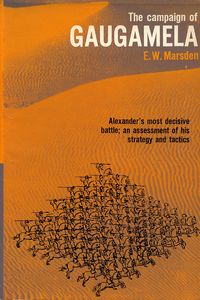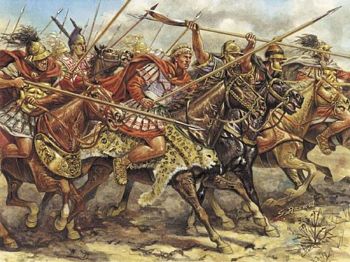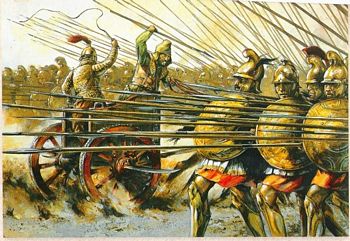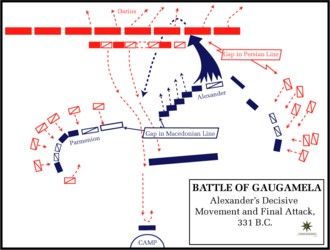campaign of Gaugamela
| série: | Alexandre le Grand |
| éditeur: | Liverpool University |
| auteur: | Marsden E.W. |
| classement: | biblio2A |
| année: | 1964 |
| format: | broché |
| état: | TBE |
| valeur: | 10 € |
| critère: | ** |
| remarques: | English book introduction - Gaugamela was Alexander's most decisive battle: an assessment of his strategy and tactics: the Waterloo of the Persian empire 1/ grand strategy - Alexander's army of 50'000 soldiers compared with Napoleon's army of 610'000 soldiers during the Russia's campaign - at Issus, the main target in the battle was to capture Darius, at Gaugamela it was the capture of the Persian empire - comments on Darius^' flight: not as an act of cowardice but in order to save the figure-head and commander-in-chief of the Persian army, in fact Alexander's target was the unconditional surrender of Darius's person - Alexander's fear was that Darius would not accept a further pitched battle after Issus and go on guerilla-war tactic, therefore the Egypt's campaign was not only to secure Alexander's bases but also to give time to Darius to form a new army so that he could accept a further pitched battle 2/ short range strategy - Alexander's choice of the long north-east route in order to get more supply for his troops so that they would arrive at the battle-pplace in better condition - first Persian failure: to get in time at the Tigris river to intercept Alexander's army when crossing the river - another reason for the defeat at Gaugamela was the staying alert during the night by the Persian army whereas Alexander's army rested well during that night 3/ numbers - the Thessalian cavalry (1500 horsemen) was together with the Companion's cavalry, the core of Alexander's cavalry - grandtotal of Alexander's army was 40'000 footmen and 7'000 horsemen - losses in Alexander's army up to Gaugamela were not severe, therefore the above figure can be reliable, also the garrison-troops left behind (rather as a kind of police-troops) were not of great numbers (Egypt being the exception), reasons for this small number of garrison-troops: - in case of victory, the rear was secured - there was no real Persian counter-attack to fear from the North (Cappadocia, Armenia) - popularity of Alexander in the Ionian cities, such as in Ephesus, was great - for the Persian army, Arrian estimated up to one millions footmen and 40'000 horsemen - reconstitution of the Persian left wing at Gaugamela 4/ the battle - contrary to the previous two battles, Alexander did not immediately enter engagement in order this time to inspect more precisely the dispositions of the enemy - numerical superiority of the Persian cavalry but no first-rate infantry left - one first good advantage for Alexander: he had obtained an excellent preview of the Persian line by occupying the natural observation-post from the hills - the initiative was with Alexander: inspection of the Persian line and reconnaissance of the battle-field whereas the Persians had to stand to arms all night - the strategical plan of Alexander was to attract the Persian cavalry on his right wing while especially prepared groups of his own cavalry and, before the enemy's cavalry could overwhelm Alexander's cavalry on the right, deliver his decisive charge - the next thing Alexander was aware of, was that this battle would need considerable adjustments as the fighting developed; therefore the reason to be carefully listened to and passed on smartly to the units - Alexander's right wing was therefore a bait to Darius so that the Companion's cavalry andthe hypaspists could execute the main thrust into the gap within the center and left flank of Darius'army - when the Persian cavalry on the left continued to overlap Alexander's right flank, Alexander's Companions used to break between the Persian center and left flank to start their charge, in form of a wedge, towards the point of contact in the Persian army - Darius realizing that the battle was for him out of control, fled again but this was not only an act of cowardice - Parmenio's message to Alexander was not a request for help but mainly to inform Alexander that the movement was correctly engaged (encirclement of the Persian center and right flank) reasons for the victory: - superior morale of the Macedonians - more balanced force, better disciplined, trained and equipped Macedonians troops - Darius' knowledge of the art of war was inferior to that of Alexander - the timing and degree of naoeuvrability of the Macedonian army - also Alexander had the better nerves to judge and choice the things to do during he heat of the battle - date of the battle: 1.10.331 B.C. 5/ Alexander's infantry: - Macedonian heavy infantry - allied Greek infantry - mercenaries - Balkan troops (Odrysians, Triballians, Illyrians) - Cretan archers, Agrianians, Macedonian archers - Alexander's cavalry: - the Companions - the Thessalians - Greek allied cavalry - Paeonians, Odrysians and Scouts - mercenaries'cavalry >> a military book dedicated to the battle of Gaugamela only and which brings some new aspects of the battle together with further interesting details, however a technical book which is not always the most attractive one to read |
| couvertures: |     |
Copyright 2008 - 2026 G. Rudolf
